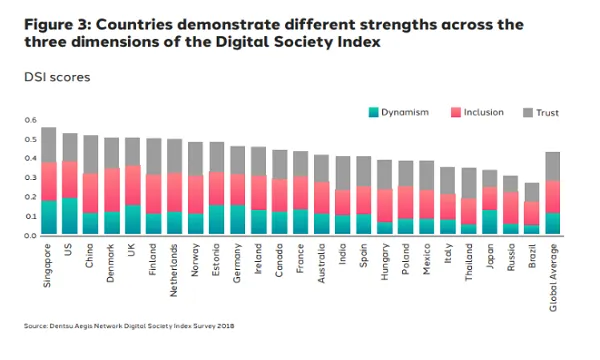
Singapore's digital adoption overlooks consumers' psychological needs: study
Nearly two-thirds of consumers believe the pace of tech change is too fast.
Amidst Singapore’s rise to the top spot as the world’s most competitive digital economy, the Lion City is failing to meet the psychological needs of digital consumers, according to a survey by Dentsu Aegis Network in partnership with Oxford Economics.
The Digital Society Index 2019 report, which polled more than 43,000 people across 24 countries, found that whilst there is widespread utilisation of digital services in Singapore, the city-state ranked the lowest on health and well-being with only one in four respondents believing that their psychological needs were met.
The next bottom five scores were all registered from people in Asian economies, which the report’s authors attributed to the stereotype that digital health is an issue only in developed economies. “As emerging markets embrace digital technologies rapidly, often leapfrogging developed markets and their legacy infrastructure, they are perhaps more aware of the sudden impact digital can have on their well-being,” they explained.
Meanwhile, it is not just the direction of technological development that is unsettling people, but the pace of change. In Singapore, nearly two-thirds of people believe the pace of tech change is too fast, whilst in India, more than 80% of people believe that the pace of technology change is too fast.

“The changing needs and awareness of consumers calls for a more balanced and creative approach to engaging people in digital products and services. It is no longer enough for organisations to rely on increasing access and extending the user base—that effort must be matched by innovation in developing a meaningful relationship with consumers,” the authors highlighted.
According to the report, it is vital to make it easier for people to update their skills over the course of their lifetime, by leveraging the potential of digital technologies to create more immersive learning experiences. The authors pointed out how in Singapore, the government has utilised virtual and augmented realities (VR) to create engaging learning modules and training for first and second-year medical students at the National University of Singapore.
The VR system, dubbed the Virtual Interactive Human Anatomy, enables its users to explore the anatomy and manipulate different parts and structures using a VR headset and handheld controllers, as well as take part in situational exercises that would be difficult to replicate in real life.
As of 2018, the system accounts for 15% of the curriculum, and the University is looking to expand the system to nursing and postgraduate students and to create more complex interactive virtual training scenarios.
The report’s authors also urged for governments to develop a balanced scorecard of digital development that focuses on inclusion and trust alongside the growth of digital industries, as well as more debate and discussion to help shape what is acceptable in terms of technology development.



![SBR 5 Lorem Ipsum News 2 [8 May]](https://cmg-qa.s3.ap-southeast-1.amazonaws.com/s3fs-public/styles/exclusive_featured_article/public/2025-05/a_hand_pointing_to_a_futuristic_technology_5b87c9d0e3_3.png.webp?itok=M3Hf-9XR)
![SBR 4 Lorem Ipsum [8 May Top Stories]](https://cmg-qa.s3.ap-southeast-1.amazonaws.com/s3fs-public/styles/exclusive_featured_article/public/2025-05/a_hand_pointing_to_a_futuristic_technology_5b87c9d0e3_2.png.webp?itok=2m5Wl0MX)


![Exclusive three SBR 12 Lorem Ipsum [8 May]](https://cmg-qa.s3.ap-southeast-1.amazonaws.com/s3fs-public/styles/exclusive_featured_article/public/2025-05/a_hand_pointing_to_a_futuristic_technology_5b87c9d0e3_11.png.webp?itok=8kn_UIfA)
![SBR 3 Lorem Ipsum [ Exclusive 2]](https://cmg-qa.s3.ap-southeast-1.amazonaws.com/s3fs-public/styles/exclusive_featured_article/public/2025-05/a_hand_pointing_to_a_futuristic_technology_5b87c9d0e3_1.png.webp?itok=YCyjLegJ)
![SBR 2 Lorem Ipsum [8 May]](https://cmg-qa.s3.ap-southeast-1.amazonaws.com/s3fs-public/styles/exclusive_featured_article/public/2025-05/a_hand_pointing_to_a_futuristic_technology_5b87c9d0e3_0.png.webp?itok=_cKD-29o)

![Video [Event News]](https://cmg-qa.s3.ap-southeast-1.amazonaws.com/s3fs-public/styles/event_news_featured_article/public/2025-05/screenshot-2025-05-08-at-4.58.53-pm_0.png.webp?itok=Kud35sMs)
![Event News SBR 9 Lorem Ipsum [8 may]](https://cmg-qa.s3.ap-southeast-1.amazonaws.com/s3fs-public/styles/event_news_thumbnail/public/2025-05/a_hand_pointing_to_a_futuristic_technology_5b87c9d0e3_8.png.webp?itok=DTh_dbYp)
![Event News SBR 9 Lorem Ipsum [8 May]](https://cmg-qa.s3.ap-southeast-1.amazonaws.com/s3fs-public/styles/event_news_thumbnail/public/2025-05/a_hand_pointing_to_a_futuristic_technology_5b87c9d0e3_7.png.webp?itok=vzDAzb6V)
![Event News SBR 8 Lorem Ipsum [8 May]](https://cmg-qa.s3.ap-southeast-1.amazonaws.com/s3fs-public/styles/event_news_thumbnail/public/2025-05/a_hand_pointing_to_a_futuristic_technology_5b87c9d0e3_6.png.webp?itok=jvHFc4P6)
![Video [Event News]](https://cmg-qa.s3.ap-southeast-1.amazonaws.com/s3fs-public/styles/video_thumbnail/public/2025-05/screenshot-2025-05-08-at-4.58.53-pm_0.png.webp?itok=yZnI0YBb)
![Video 1 SBR [8 May]](https://cmg-qa.s3.ap-southeast-1.amazonaws.com/s3fs-public/styles/video_thumbnail/public/2025-05/screenshot-2025-05-08-at-4.58.53-pm.png.webp?itok=9AAeRz_k)

 Advertise
Advertise

